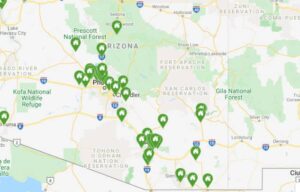Learn Everything About an AZ House
Have you ever wondered about the history of a house in Arizona? Whether you’re a prospective buyer, a curious neighbor, or even considering selling, understanding how to navigate Arizona property records is crucial. This guide will walk you through the steps to uncover every little detail about an AZ house. If you’re in a rush to sell, remember, Andrew The Home Buyer is your go-to for a quick cash offer!

Why Search Property Records?
- Uncover Property History: Learn the house’s past, from previous owners to renovations.
- Understand Value: Gauge the property’s market value and fluctuations over time.
- Legal Clarity: Ensure no legal disputes or liens affect the property.
Getting Started: Accessing Public Records
State and County Resources
- Maricopa County Recorder’s Office: Ideal for properties in Phoenix and surrounding areas.
- Pinal County Records: Perfect for digging into properties in more rural locales.
Online Databases
- Arizona State Library, Archives, and Public Records: A treasure trove of historical and current property data.
Using state and county resources such as the ones mentioned above offers several benefits for those looking to search Arizona property records:
Comprehensive and Reliable Data: These resources provide authoritative and up-to-date information. They are maintained by government agencies, ensuring the data’s accuracy and reliability.

Ease of Access: With the advent of online databases, accessing these records has become more convenient. You can search for information from the comfort of your home or office, saving time and resources.
Detailed Property History: These resources offer a wealth of information, including ownership history, property tax records, transaction details, and sometimes even architectural details or historical significance of a property.
Legal Documentation and Clarity: They are invaluable for obtaining legal documents such as deeds, liens, and easements. This information is crucial for understanding any legal implications associated with a property, like disputes or encumbrances.
Valuation and Market Analysis: For those interested in the financial aspect, these records provide essential data for property valuation and market trend analysis. This is particularly useful for potential buyers, investors, or those considering selling their property.
Historical Research: The Arizona State Library, Archives, and Public Records, in particular, can be a gold mine for historical research, offering insights into the historical context and evolution of a property or area.
Geographical Coverage: Each resource is tailored to specific geographical areas. For instance, the Maricopa County Recorder’s Office is ideal for urban and suburban properties in Phoenix and surrounding areas. At the same time, Pinal County Records cater to more rural locales, providing more targeted and relevant information.
Planning and Development Insights: These resources can also be helpful for urban planning, historical preservation efforts, and development projects, providing a historical perspective and current data critical for such endeavors.
Public Transparency and Accountability: Public access to these records ensures transparency in property transactions, fostering a sense of trust and accountability in real estate dealings.
Support in Legal and Financial Decisions: For individuals dealing with inheritances, property disputes, or financial planning involving real estate, these records provide essential information that supports informed decision-making.

Understanding the Jargon
- Title Searches – Learn the legal ownership history of the property.
- Tax Records –Delve into the property’s tax history, including any unpaid dues.
When a home buyer or seller delves into title searches and tax records, they can glean a wealth of crucial information that can significantly influence their decisions and the overall real estate transaction process. Here’s what they can learn from each:
Title Searches: Understanding the Property’s Legal Ownership History
- Ownership Chain: Title searches reveal the sequence of historical owners of the property. This helps in understanding how the property has changed hands over time.
- Existing Liens or Encumbrances: They can uncover any liens (legal claims) against the property, such as mortgages, unpaid debts, or judgments, which must be cleared before a sale.
- Easements and Restrictions: Title searches can reveal any easements (rights for others to use the property for specific purposes) or covenants (restrictions on property use) that might affect how the property can be used or developed.
- Legal Disputes or Claims: They can identify any ongoing legal disputes or claims on the property that might affect the transfer of ownership.
- Boundary and Survey Issues: Information about property boundaries and any related disputes or discrepancies can also be found, which is crucial for understanding the exact size and extent of the property.
- Title Insurance Preparation: This information is essential for securing title insurance, which protects against financial loss from defects in title to real estate.
Tax Records: Delving into the Property’s Tax History
- Property Tax Status: Tax records show whether property taxes have been paid up to date. Unpaid taxes can lead to liens on the property.
- Assessment of Property Value: They often include estimates of the property’s value for tax purposes, which can be a helpful indicator of its market value.
- Tax Rate Information: Understanding the tax rate applied to the property can help estimate future tax liabilities.
- Historical Tax Trends: Looking at the history, buyers, and sellers can identify trends in tax increases or decreases, which can impact the long-term affordability of the property.
- Special Assessments or Levies: Any special assessments for local improvements (like new infrastructure) that might affect the property’s value or future tax obligations can be identified.
- Exemptions or Rebates: Information about any tax exemptions (for seniors, veterans, etc.) or rebates for which the property is eligible can also be found in these records.

Can You Empty a House Before Probate
Demystifying Property Records Searches
Can I find out a property’s sale history?
Absolutely! This information is part of public records accessible through county websites or real estate agents.
Is there a cost involved in accessing these records?
It varies. Some forms are free, while others might require a nominal fee.
How accurate are online property records?
It’s generally very accurate, but it’s always good to cross-reference with other sources.
Has a property had any legal issues?
Yes, legal disputes or liens are recorded in public records.
How can I use property records to assess a house’s value?
Look at past sale prices and tax assessments and compare them with current market trends.
What if I need to sell my house quickly in Arizona?
Contact Andrew, The Home Buyer, for a fast, cash offer on your property.
When Speed Matters: Selling Your House Fast in Arizona
Companies like Andrew The Homebuyer specialize in fast, cash offers for houses in Arizona. Avoid the long process of traditional selling; it is perfect for urgent situations.

Andrew The Cash Home Buyer
Empower Your Real Estate Decisions
Whether diving into property records to satisfy your curiosity, assess a potential investment, or prepare for a sale, the information available can be a game-changer. And remember, if you’re looking to sell fast, Andrew The Homebuyer is ready to make a cash offer for your Arizona house.
Find Out What Your Home is Worth!
Need to sell your Arizona house fast?
Request a cash offer from Andrew, The Home Buyer, today and discover the value of your property in no time!







